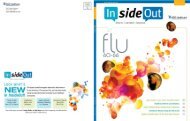media - ASD Healthcare
media - ASD Healthcare
media - ASD Healthcare
Create successful ePaper yourself
Turn your PDF publications into a flip-book with our unique Google optimized e-Paper software.
Privigen ®Immune Globulin Intravenous (Human),10% LiquidInitial U.S. Approval: 2007BRIEF SUMMARY OF PRESCRIBING INFORMATIONThese highlights do not include all the information needed to use Privigensafely and effectively. See full prescribing information for Privigen.WARNING: ACUTE RENAL DYSFUNCTION/FAILURESee full prescribing information for complete boxed warning.• Renal dysfunction, acute renal failure, osmotic nephropathy, and deathmay occur with the administration of human immune globulin intravenous(IGIV) products.• Renal dysfunction and acute renal failure occur more commonly in patientsreceiving IGIV products that contain sucrose. Privigen does not containsucrose.• For patients at risk of renal dysfunction or renal failure, administerPrivigen at the minimum infusion rate practicable.------------------------------------INDICATIONS AND USAGE----------------------------------Privigen is an Immune Globulin Intravenous (Human), 10% Liquid indicated for thetreatment of:• Primary humoral immunodefi ciency (PI)• Chronic immune thrombocytopenic purpura (ITP)-------------------------------DOSAGE AND ADMINISTRATION-----------------------------Intravenous Use OnlyIndication Dose Initial InfusionRateMaintenance InfusionRate (if tolerated)PIITP200-800 mg/kg(2-8 mL/kg)every 3-4 weeks1 g/kg (10 mL/kg) for2 consecutive days0.5 mg/kg/min(0.005 mL/kg/min)0.5 mg/kg/min(0.005 mL/kg/min)Increase to 8 mg/kg/min(0.08 mL/kg/min)Increase to 4 mg/kg/min(0.04 mL/kg/min)• Ensure that patients with pre-existing renal insuffi ciency are not volume depleted, anddiscontinue Privigen if renal function deteriorates.• For patients at risk of renal dysfunction or thrombotic events, administer Privigen atthe minimum infusion rate practicable.--------------------------------DOSAGE FORMS AND STRENGTHS-------------------------Privigen is a liquid solution containing 10% IgG (0.1 g/mL).---------------------------------------CONTRAINDICATIONS -----------------------------------• History of anaphylactic or severe systemic reaction to human immune globulin• Hyperprolinemia (Privigen contains the stabilizer L-proline)• IgA-defi cient patients with antibodies to IgA and a history of hypersensitivity------------------------------WARNINGS AND PRECAUTIONS-------------------------------• IgA-defi cient patients with antibodies to IgA are at greater risk of developing severehypersensitivity and anaphylactic reactions.• Monitor renal function, including blood urea nitrogen and serum creatinine, and urineoutput in patients at risk of developing acute renal failure.• Thrombotic events may occur. Monitor patients with known risk factors forthrombotic events; consider baseline assessment of blood viscosity for those at risk ofhyperviscosity.• Hyperproteinemia, increased serum viscosity, and hyponatremia may occur.• Aseptic meningitis syndrome (AMS) may occur, especially with high doses or rapidinfusion.• Hemolysis that is either intravascular or due to enhanced red blood cell sequestrationcan develop subsequent to Privigen treatments. Risk factors for hemolysis include highdoses and non-O blood group. Closely monitor patients for hemolysis and hemolyticanemia.• Monitor patients for pulmonary adverse reactions (transfusion-related acute lung injury[TRALI]).• Carefully consider the relative risks and benefi ts before prescribing the high doseregimen (for chronic ITP) in patients at increased risk of thrombosis, hemolysis, acutekidney injury, or volume overload.• Privigen is made from human blood and may contain infectious agents, e.g., virusesand, theoretically, the Creutzfeldt-Jakob disease (CJD) agent.------------------------------------ADVERSE REACTIONS-------------------------------------• PI – The most common adverse reactions, observed in >5% of study subjects, wereheadache, pain, nausea, fatigue, chills, vomiting, joint swelling/effusion, pyrexia, andurticaria. Serious adverse reactions were hypersensitivity, chills, fatigue, dizziness, andincreased body temperature.• Chronic ITP – The most common adverse reactions, observed in >5% of studysubjects, were headache, pyrexia/hyperthermia, positive direct antiglobulin test (DAT),anemia, vomiting, nausea, bilirubin conjugated increased, bilirubin unconjugatedincreased, hyperbilirubinemia, and blood lactate dehydrogenase increased. A seriousadverse reaction was aseptic meningitis.To report SUSPECTED ADVERSE REACTIONS, contact CSL BehringPharmacovigilance at 1-866-915-6958 or FDA at 1-800-FDA-1088 orwww.fda.gov/medwatch.----------------------------------DRUG INTERACTIONS---------------------------------------The passive transfer of antibodies may:• Lead to misinterpretation of the results of serological testing.• Interfere with the response to live virus vaccines.----------------------------USE IN SPECIFIC POPULATIONS---------------------------------• Pregnancy: No human or animal data. Use only if clearly needed.• In patients over age 65 or in any patient at risk of developing renal insuffi ciency,do not exceed the recommended dose, and infuse Privigen at the minimum ratepracticable.Based on February 2013 revision.34 InsideOut






